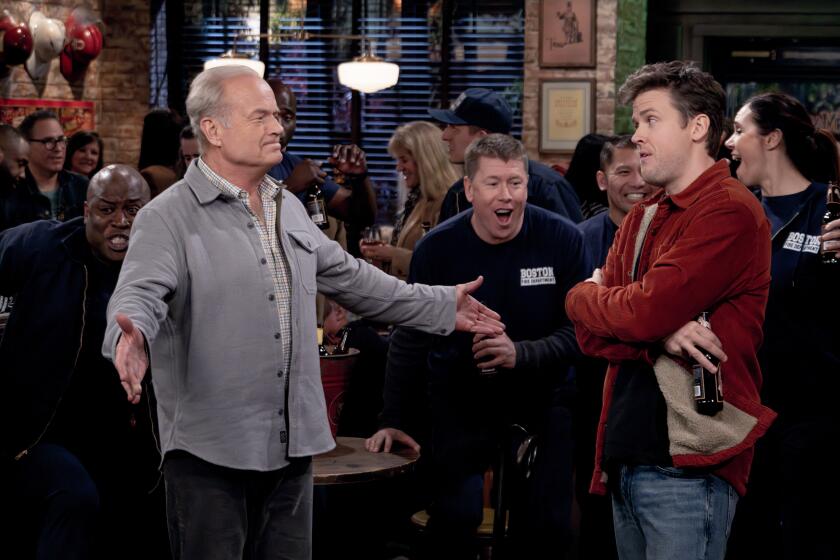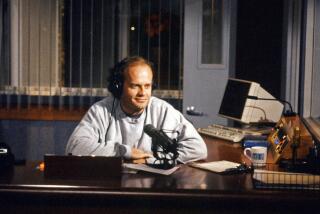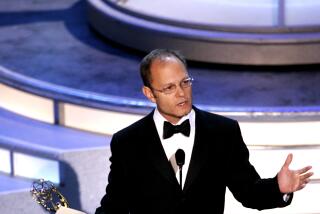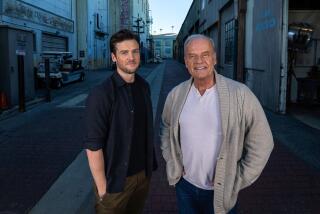
- Share via
Reviving “Frasier” was a no-brainer. But it took a lot of thought to bring back the vaunted sitcom — which in 11 seasons on NBC won 37 Emmys, more than any other in its genre, by the time it signed off in 2004 — nearly two decades later.
“The idea was to put him in a new world and discover he still had some of the same issues but had matured some,” Kelsey Grammer, who himself won four out of 10 Emmy nominations for playing the highly cultured, easily agitated psychiatrist Frasier Crane, says of the Paramount+ continuation that began last year and is now shooting its second season old-school style: with three cameras in front of a live audience. “He was a little wiser, a little more mellow, successful in some ways that Frasier hadn’t been previously.”
The new iteration sees Frasier returning to Boston — where the character had been introduced on the earlier hit sitcom “Cheers” — to teach at Harvard following a lucrative if ultimately ludicrous career as a radio and TV host. No other characters from the Seattle-set first “Frasier” were regulars in Season 1 of the reboot, though ex-wife Lilith (Bebe Neuwirth) and radio producer Roz (Peri Gilpin) made guest appearances. (Entertainment Weekly recently reported that Gilpin’s role is expanding in the second season, and although there are no plans to get drinks at Cheers, Grammer told The Envelope he’d like to see Frasier close things with Shelley Long’s Diane.)
A writer who identifies as a mixed-Black woman considers why she loves “Frasier” despite its lack of diversity, and how she hopes the reboot will continue to develop its new characters.
The new cast includes British actors Nicholas Lyndhurst as Frasier’s college friend turned Harvard colleague Alan Cornwall and Jack Cutmore-Scott as Frasier’s fireman son and semi-reluctant roommate, Freddy Crane. They partially fill some of the positions brother Niles (David Hyde Pierce) and dad Martin (the late John Mahoney) played in the earlier incarnation. An effort was made to make “Frasier” 2.0 fresh though still informed by the character’s rich backstory.
“We never actually wanted to do the same show,” notes 69-year-old actor-producer Grammer, looking fit in jeans, black polo shirt and bright red sneakers at his homey office suite on Paramount’s Melrose Avenue lot. “I felt like that would be frozen in time and wouldn’t be relevant anymore. Boston opened up in my mind; Frasier didn’t finish in Boston, he left. So going back was important to close up some old wounds and maybe redefine himself a little.”
Chris Harris (“How I Met Your Mother”) and Joe Cristalli (“Life in Pieces”) were chosen to head the new series’ creative team.
“They had a kind of adolescence about their thinking,” Grammer says of the showrunners. “I thought that could provide a fresher note for this manifestation of ‘Frasier.’ They brought a little bit more silliness to it. I still have to calm them down once in a while! But we took ourselves pretty seriously back in the old days, and maybe some of that was a little too much.”

Which is not to say the new “Frasier” shies away from what Grammer calls “at least college-level” discourse. He introduced the original sitcom to critics as playing up to the audience, not down, a rarity at the time and somewhat still. As if to ensure a link to that, “Cheers” co-creator James Burrows (“Best director in television, no question about it,” Grammer says) helmed the first two episodes of both new “Frasier” seasons. Grammer, who started calling shots later in the first series’ run, directs around half of the new episodes. (No date has been announced for the premiere of Season 2.)
“Frasier is a good-natured, buffoonish character at times, who is intellectual,” Grammer says. “He’s a very smart guy, but he misses the point in some things because he’s a little too involved in his intellect. Do we honor the intellectual? Yes, we try to because, honestly, it’s rarefied air up there. When you understand the nuances of what it means to have this conductor interpreting a piece of music by this composer, as Frasier does, it actually makes for interesting television watching.”
Adjacent to that, Juilliard-trained stage veteran Grammer reveals the secret for delivering esoteric, reference-laden dialogue in an amusing, natural manner.
“You want to be careful about overwriting,” he explains. “What’s nice about Frasier’s erudition is he’s actually quite specific about what he wants to say, so the jumble of words is not really unconnected to what he’s trying to make clear. The specificity makes it easy to remember; it’s really like doing Shakespeare. If there’s too much chat in the language, I’ll suggest winnowing it down so it makes a more concise point.”

Clinical psychology plays less of a role in this show about a psychiatrist than you’d think. Grammer notes there were a couple of psych majors on the original series’ writing staff, but their expertise didn’t come into play that much.
“When an actor goes to acting school, you’re basically going through psychoanalysis anyway,” he reckons. “It’s uncovering, discovering, discarding and then using what you know about the human condition.”
The four-times-married father of seven has had his bouts of substance abuse and related run-ins with the law, which more directly led to analysis than anything about his TV job.
“I did some therapy when I was wrestling with a lot of grief stuff,” Grammer says. “It derailed my personal life — in my professional life I was always pretty rational — but I needed to get a little help, mostly on relationships. After that, honestly? Playing Frasier, being an actor, this kind of stuff is therapeutic.”
The actor, who played pastor Chuck Smith in the recent faith movie hit “Jesus Revolution,” also finds solace in Christianity.
“I don’t go around proselytizing, but I’m not going to deny it either: I’m a Jesus guy,” Grammer says. “I like him, he’s helped me out a lot. My comfort with that has grown exponentially as I’ve realized it completes me. I’m a better man because of it. I make better decisions. I’m better at home, I’m a better dad.”
Is the new ‘Frasier,’ premiering Thursday on Paramount+, as good as the old “Frasier”? So far, it stacks up well, our critic writes.
As for his status as one of Hollywood’s notable political conservatives, Grammer again points out that he doesn’t engage too much but is firm in his beliefs.
“It’s been proven over and over again that whenever we make the government larger, people get worse off,” he says. “I’m quite willing to do my part, always have paid my fair share, although I’m in that rare category where, including real estate taxes, I’m above 70%. That’s challenging. People complain about living paycheck to paycheck; it’s weird when you’re me and I’m doing it!”
Another reason to revive “Frasier.” The main one, though, was to see if the show could still be done as well as before.
“You want to make sure that the quality stays at a certain level,” Grammer says of the biggest challenge. “The temptation to settle on an easy joke that sort of works is something that you have to resist. And we resist it — with a few that get away [laughs]. We try to lay it out so we have one good laugh every three pages instead of three bad laughs on every page. Be sparing about it, choose your moments because, really, the story is what’s most important. The thing that the audience will identify with is not necessarily how much they’re laughing but why they’re laughing.”
More to Read
From the Oscars to the Emmys.
Get the Envelope newsletter for exclusive awards season coverage, behind-the-scenes stories from the Envelope podcast and columnist Glenn Whipp’s must-read analysis.
You may occasionally receive promotional content from the Los Angeles Times.








